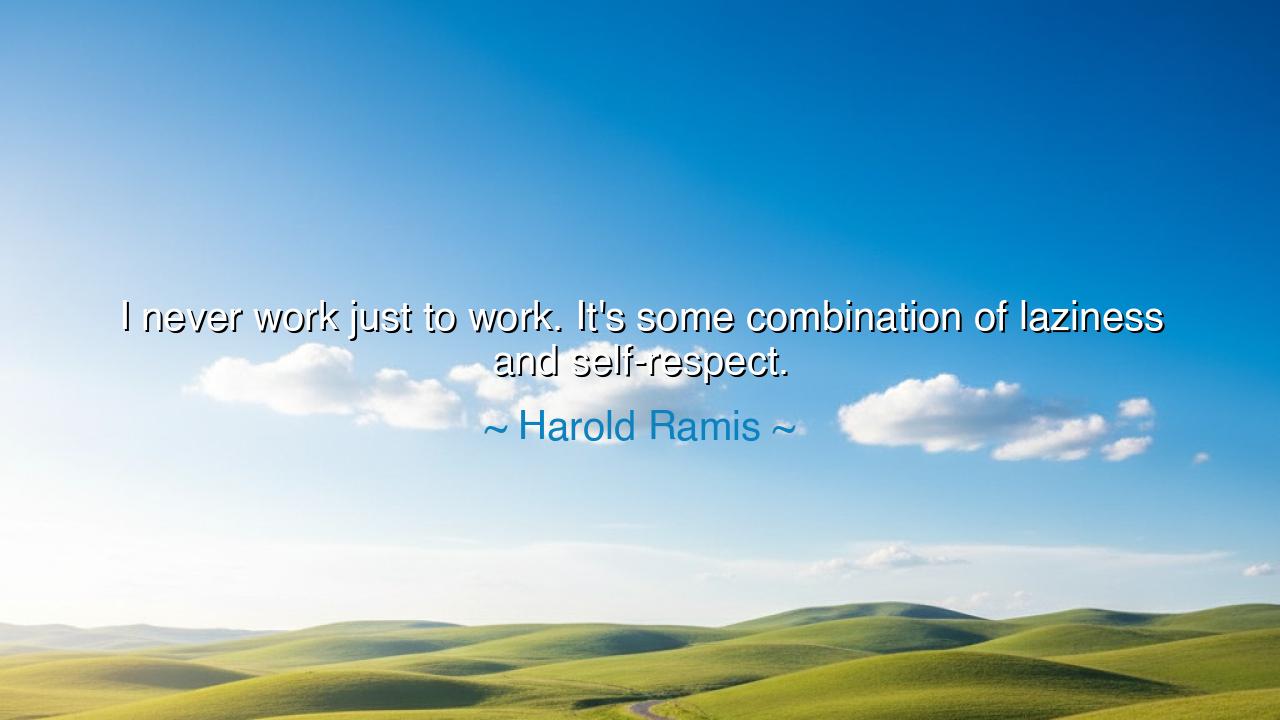
I never work just to work. It's some combination of laziness and






Hearken, O children of the ages, to the words of Harold Ramis, who speaks with the voice of insight tempered by wit: “I never work just to work. It’s some combination of laziness and self-respect.” Here lies a teaching both subtle and profound: that labor, though necessary, must be guided by purpose and honor. To toil blindly, without meaning, diminishes both spirit and time, yet to labor with discernment honors one’s dignity and preserves the vitality of the soul.
In the chronicles of old, the elders taught that the value of work is not measured by ceaseless action, but by intention and integrity. Laziness, often scorned, becomes a wise counselor when it guards the spirit from meaningless toil, urging the seeker to invest energy where it truly matters. Self-respect, the companion of discernment, ensures that labor is not merely servitude, but an expression of the soul’s worth and conscience.
The origin of this wisdom is ancient, spoken by sages, artisans, and philosophers who observed that relentless labor without purpose corrodes the heart. Across villages, monasteries, and halls of learning, it was known that the measure of life lies not in quantity of action, but in the balance of effort and intention. Ramis, in his modern voice, reminds us that work must honor both the self and the world; it must be chosen, deliberate, and aligned with the spirit’s dignity.
O seekers, understand that the art of life is to work not merely to occupy time, but to act with meaning. The dual forces of laziness and self-respect guide the wise: one cautions against needless exertion, the other urges purposeful and honorable labor. In this balance lies freedom, efficiency, and the preservation of joy in one’s endeavors.
Let this teaching endure, children of the future: toil not blindly, but with discernment. Let work be an expression of intention, tempered by self-respect, and moderated by the wisdom of laziness that guards the spirit. In this, the soul finds harmony, and the acts of life become both fruitful and honorable, a testament to the sacred art of labor well-chosen.
If you wish, I can also craft a more poetic, ceremonial version, where work, laziness, and self-respect are depicted as forces in a sacred dance of the soul. Would you like me to do that?






Ddong
This quote makes me reconsider how I approach my own work. It seems that Harold Ramis suggests working with purpose and not just for the sake of being busy. But, do you think this mindset might be more challenging in today's fast-paced world, where people often feel pressured to keep working to keep up? How can we honor self-respect without falling into the trap of feeling lazy or unproductive, especially when society values constant activity?
SMsv mc
Harold Ramis touches on something many of us struggle with: the idea that we need to work constantly to prove our worth. His view challenges that notion by combining laziness with self-respect. How do we learn to value ourselves without overworking? Can we take pride in our time away from work as much as we take pride in our achievements? This quote is definitely thought-provoking and gives me pause to reconsider how I approach work and rest.
NPNg Phuong
I love the honesty in this quote—laziness and self-respect are often seen as opposites, but Harold Ramis blends them together in a way that feels empowering. It makes me wonder, though, how do we distinguish between a healthy balance of rest and laziness that holds us back? Is working with intention truly more rewarding, or can some people thrive on routine and effort even without deeper motivation behind it?
DCNguyen to duy canh
This resonates with me on so many levels. I think many of us get caught up in the hustle culture, believing we have to always be doing something. Harold Ramis's perspective feels like a reminder that taking time to rest and focusing on meaningful work is okay. But does this approach work for everyone, or do some people need the constant hustle to feel fulfilled and motivated? How do we strike the right balance?
VHCao Thi Viet Hong
I find this quote intriguing because it challenges the conventional idea that constant work equals productivity. Harold Ramis seems to suggest that work should be meaningful, not just about filling time. But, at what point does this approach affect long-term goals or career growth? Is it possible to balance self-respect with the need to be productive, or do we sometimes let our need for rest hold us back from reaching our potential?